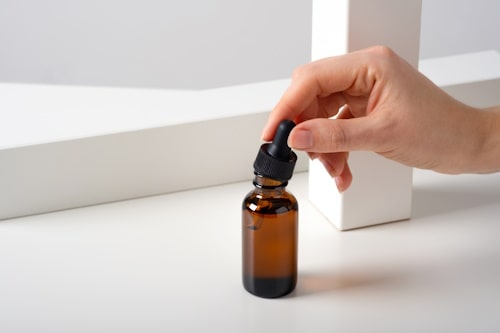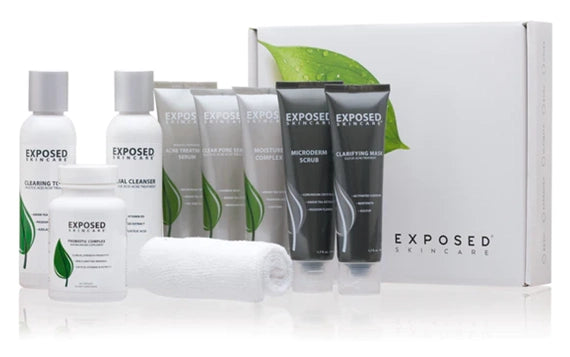Frankincense is an ancient oil derived from the resin of the Boswellia tree. It has been celebrated for its skincare benefits, particularly in reducing the appearance of scars and fine lines.
However, the efficacy of frankincense in treating acne is debated. This article aims to shed light on why frankincense oil, despite its numerous benefits, might not be the go-to solution for everyone battling acne.
Also read: How to choose the best acne treatment
Biggest Take-Aways:
- Frankincense oil can be beneficial for skin health but may cause irritation or allergic reactions, and its strong scent can be overwhelming for some users.
- It's important to dilute frankincense oil with a carrier oil to minimize skin irritation and maximize its benefits.
- Frankincense oil's effectiveness in treating acne is not universal and varies depending on individual skin types and conditions.
- Exposed Skin Care is a more effective and comprehensive alternative for managing acne, offering targeted treatment and additional skincare benefits.

The Allure of Frankincense in Skincare
Frankincense oil is often hailed for rejuvenating skin and calming the senses. It has found its way into various beauty care products, from oil diffusers to skin care products.
Its soothing aroma is a star ingredient in high-quality skincare formulations. So, it is no surprise that frankincense's popularity seems unwavering. But is it really the best solution for acne-prone skin?
Reason 1: Potential Skin Irritation
Understanding the Risk with Essential Oils
- Essential Oil Safety: Frankincense essential oil, like many others, can cause skin irritation or allergic reactions in some individuals. Although beneficial for some skin types, the compounds in frankincense might not agree with sensitive or acne-prone skin.
- Dilution Is Key: Essential oils, including frankincense, should be diluted with a carrier oil like jojoba oil before application. However, the right dilution ratio can be tricky, and getting it wrong could lead to adverse reactions.
Why Choose Caution?
- Personal Skin Chemistry: Everyone's skin is different. What works as a miracle for one might be a problem for another. This uncertainty makes frankincense oil a gamble for those with acne.

Reason 2:The Overpowering Aroma
Not Just About the Skincare Benefits
- Aroma Intensity: Frankincense oil's strong, distinctive aroma can be overwhelming for some. This intense scent might not be pleasant for everyone when used in skincare, especially near the face.
- Diffuser vs. Topical Use: While the oil works well in a diffuser, spreading a calming scent, its concentrated aroma directly on the skin can be too much for some users.
Reason 3: Complications with Oil-Based Products
Understanding the Role of Sebum
- Acne and Oil: Acne often results from excess sebum production. Adding more oil, even natural ones like frankincense essential oil, might exacerbate the issue.
- Carrier Oil Choices: The type of carrier oil used with frankincense can also play a role. Some oils might clog pores or further irritate the skin, especially if not non-comedogenic like high-quality jojoba oil.
Reason 4: Cost and Accessibility Concerns
Investing in Pure Frankincense
- High-Quality Matters: To reap the full benefits of frankincense oil, opting for pure, high-quality oil is crucial. However, this can be pretty expensive.

- Accessibility Issues: Finding genuine, pure frankincense oil can be challenging, leading to the risk of purchasing adulterated or low-quality products.
Reason 5: Ineffective for Certain Acne Types
Not a One-Size-Fits-All Remedy
- Acne Variability: Acne can manifest in various forms - from hormonal to bacterial. Frankincense oil might not be effective against all types, particularly more severe forms.
- Lack of Comprehensive Research: While anecdotal evidence suggests some benefits, there is a lack of comprehensive research specifically focusing on frankincense for acne treatment.
Exploring Alternatives
Seeking Other Solutions
- Diverse Skincare Arsenal: It's important to have various products and ingredients to tackle different skin concerns. Frankincense might be a part of it, but it should not be the only solution.
- Embracing Variety: Numerous other essential oils and skincare ingredients might be more suitable for acne-prone skin. Exploring these options can be beneficial.
The Role of Lifestyle Factors
- Beyond Topical Treatments: Acne management isn't just about what you put on your skin. Diet, stress levels, and overall lifestyle play a significant role.
The Benefits of Exposed Skin Care in Managing Acne
Exposed Skin Care is a noteworthy contender in the vast array of acne management options. This product line is designed to tackle acne effectively while offering additional skincare benefits.
Here's why it stands out:
- Targeted Acne Treatment: Exposed Skin Care is formulated to specifically address acne, making it a focused solution for those dealing with this skin concern.
- Comprehensive Approach: The range includes various products, ensuring a holistic approach to skincare.
- Cleansers and Toners: These products cleanse the skin and provide astringent properties, helping to reduce excess oil and unclog pores.
- Serums and Creams: They not only target acne but also work on reducing the appearance of wrinkles and fine lines, offering a dual benefit.
- Skin Nourishment: The line is enriched with natural ingredients that nourish the skin, promoting a healthier complexion.
- Stretch Marks and Scar Care: While primarily targeting acne, some products in the Exposed Skin Care range may also help reduce the appearance of stretch marks and scars, making it a versatile choice for overall skin health.
- Balancing Skin Tone: Regular use can help improve skin tone, leading to a more balanced and radiant complexion.
With its multifaceted benefits, Exposed Skin Care could be a valuable addition to your skincare regimen, particularly if you want to manage acne effectively while addressing other skin concerns like wrinkles and uneven skin tone.
Conclusion
While many advocate using frankincense oil for acne treatment, weighing its benefits against potential drawbacks is crucial. Frankincense oil, with its astringent properties and ability to help reduce the appearance of fine lines and scars, has been a traditional staple in skincare.
Its ability to rejuvenate skin cells and promote a healthy skin tone is undeniable. However, the need to dilute frankincense with an unscented carrier oil, its strong aroma, and the possibility of skin irritation underscore the importance of cautious use.
Frankincense oil can be a powerful addition to a skincare routine, but it's essential to understand its properties and how they interact with your skin type. Its role in an oil blend, particularly for those with sensitive skin, should be carefully considered.
Furthermore, while frankincense oil can help fight signs of aging and protect the skin, alternatives like Exposed Skin Care offer a more targeted approach to acne management.
This product line addresses acne directly while also catering to overall skin health, making it an ideal choice for those seeking comprehensive skincare solutions. Exposed Skin Care can lead to more effective and satisfying skincare experiences.
FAQs
Can Frankincense Oil Cause Skin Irritation?
Yes, frankincense oil can cause skin irritation or allergic reactions in some individuals, especially when not appropriately diluted with a carrier oil.
Is the Aroma of Frankincense Oil Overpowering for Skincare Use?
The aroma of frankincense oil can be quite strong and overpowering for some people, particularly when applied directly on the face.
Can Frankincense Oil Exacerbate Acne?
There's a possibility that frankincense oil, especially if used undiluted or in high concentrations, can exacerbate acne for some individuals due to its oil base.
Are There Cost and Accessibility Concerns with Frankincense Oil?
Yes, high-quality, pure frankincense oil can be expensive and sometimes difficult to find, leading to concerns about purchasing adulterated or low-quality products.
How Does Exposed Skin Care Compare to Frankincense Oil for Acne?
Exposed Skin Care offers a more targeted and comprehensive approach to acne treatment than frankincense oil. It's specifically formulated to address acne and helps nourish the skin and reduce the appearance of scars and uneven skin tone.


















